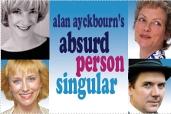Absurd Person Singular
Three kitchens, three Christmases and three married couples combine in three acts to provide this tale of the rise and demise of different social classes. The acts in fact have much in common with Dickens' tale 'A Christmas Carol', because like the ghosts of Christmas past, present and future, they take place 'Last Christmas', 'This Christmas' and 'Next Christmas'. So, what we witness on stage ends up being a kind of vision of the future, which actually turned out to be quite accurate. Playwright Alan Ayckbourn obviously has talents as a clairvoyant to add to his many theatrical capabilities.
It all kicks off with a party on Christmas Eve ('Last Christmas') at the home of Jane and Sydney who are about to entertain what they presumably consider their social 'betters' - a bank manager and his wife, and an architect and his wife among them. Jane is obsessed with cleaning, and both she and husband Sidney are on edge as the appointed hour of the party arrives. Of course, their well-laid plans fall apart as Jane forgets where she's put the tonic and has to go out in the pouring rain to fetch some more. In act 2 ('This Christmas') architect's wife Eva has had enough of her husbands philanderings, and attempts to commit suicide amidst another party gathering of the same people. Finally, in 'Next Christmas' at the home of the banker and his wife, Jane and Sidney (now more prosperous, and thus more confident) turn up to find their hosts have no heating, and their hostess in an alcoholic stupor.
Alan Ayckbourn (or Sir Alan Ayckbourn, to give him his worthy title) has written around 70 plays which must make him one of the nations' most prolific writers. Most of his plays get their first airing in the theatre in Scarborough where he is the artistic director. 'Absurd Person Singular' was first produced way back in 1972. The title seems a little odd for the subject matter, though you could stretch your mind a little to concoct a justification for why it works. However, the truth of the matter seems to be that Ayckbourn had the title in mind for another play which he didn't get round to writing, but liked it enough to use it for this one. Which just goes to prove that truth often lies in the simplest explanations - conspiracy theorists take note.
Alan Strachan's direction is pretty much flawless and his choice of cast could hardly have been better. David Bamber's dapper Sidney is an irritatingly tedious example of an ex-military type on the up. Saluting his wife at regular junctures, and with a pencil moustache that likens him to a second-hand car salesman, his initial nerves have disappeared come the third act by which time business success sets him above his social 'superiors'. Jenny Seagrove makes the transition from patronising, snooty banker's wife to dejected alcoholic seem effortless, and Jane Horrocks as Jane is a mousey housewife whose dedication to housework borders on being a profession.
The second of the three acts is the funniest and the most absurd, largely thanks to a fine performance by Lia Williams. During the entire act she says absolutely nothing as she tries numerous means of committing suicide. Her husband and their guests ignore her suicide notes, and translate her blatant attempts to kill herself as requests for assistance with the housework and electrical repairs.
Though it's relatively easy to see the influences of the 60s and 70s - particularly in the decor - the play doesn't feel that dated. And though it's a rather long piece, the intervals between acts make it more palatable and easier to digest. However, this isn't the kind of play that will have anyone guffawing in convulsions of uncontrollable hysterics. We certainly laugh - and sometimes cringe - but it's subtle and relatively gentle humour that will, I suspect, appeal to those of a 'certain age'. I can't see this play packing in the under 30s, even if it is pretty much a classic of its type. In a sense that's a pity, because Ayckbourn's play is well-constructed and takes risks with both the settings (all the action taking place in kitchens) and the subject-matter. It was also far ahead of its time in describing the decline of the middle classes, and the rise of those in more profitable trades.
What the critics had to say.....
NICHOLAS DE JONGH for THE EVENING STANDARD says, "An irresistable piece of theatre." PAUL TAYLOR for THE INDEPENDENT says, "Enjoyable." MICHAEL BILLINGTON for THE GUARDIAN says, "The joy of Alan Strachan's production is that it combines furious fun with the awareness of Ayckbourn's larger purpose." CHARLES SPENCER for THE DAILY TELEGRAPH says, "This is a classic night of Ayckbourn. It feels almost indecent to laugh but somehow you just can't stop yourself." BENEDICT NIGHTINGALE for THE TIMES says, "It's dark, it's hilarious and, in Alan Strachan's strongly cast, finely acted production, it is often both at once."
External links to full reviews from popular press
The Independent
The Guardian
Daily Telegraph
The Times
Originally published on
